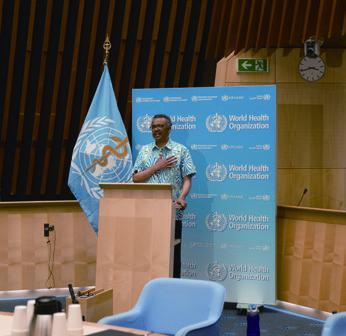Continuing The Global Fight
By Ma Miaomiao

China will continue international cooperation in the global battle against the novel coronavirus disease (COVID-19), provide foreign assistance and make its domestically developed vaccine a global public good when available. President Xi Jinping made the announcement at the opening of the 73rd Session of the World Health Assembly (WHA) via video link on May 18.
“China will provide $2 billion over two years to help with COVID-19 response, and with economic and social development in affected countries, especially developing countries,” Xi said at the meeting of the governing body of the World Health Organization (WHO).
As the most serious global public health emergency since the end of World War II, COVID-19 had hit over 210 countries and regions, infected more than 5 million people and claimed over 330,000 lives as of May 21.
Xi pointed out that confronted by the ravages of COVID-19, the international community has not flinched. “The people of all countries have tackled the virus head on. Around the world, people have looked out for each other and pulled together as one. With love and compassion, we have forged extraordinary synergy in the fight against COVID-19,” he said.
George Papandreou, former Greek Prime Minister, told Xinhua News Agency, “It is important to put aside narrow nationalistic perceptions and fi nd a way to work together. Our countries may have different experiences, systems and levels of development, but we can certainly find common ground for collaborating on the most important shared problems.”
He said, “Putting the interest of our peoples fi rst does not mean unilateralism. It means cooperation for the benefit of all. It means peaceful collaboration, learning and helping each other.”
Support for WHO
In his speech, Xi called on the international community to increase political and fi nancial support for WHO in order to mobilize resources worldwide to defeat the virus.
A draft resolution on COVID-19 adopted at the WHA by consensus on May 19, drafted by the EU and co-sponsored by dozens of countries, affi rms and supports WHOs leading role and calls on all member states to prevent discrimination and stigmatization, combat misinformation and disinformation, strengthen international cooperation and research into the zoonotic source of the virus, and at the appropriate moment, evaluate the work of WHO.
Australian Foreign Minister Marise Payne reportedly described it as international support for an “independent review” of the pandemic and “a win for the international community.” But according to Zhao Lijian, a Chinese Ministry of Foreign Affairs spokesperson, on May 20, the content of the draft resolution was totally different from what had been alleged by the Australian side earlier.
“For example, the draft resolution proposes to start assessment in due time instead of an immediate so-called review, reaffi rms the key leading role of WHO instead of switching to other leaderships and calls for summarizing experiences and lessons gathered in international health responses coordinated by WHO instead of a ‘presumed guilty investigation targeting a specifi c country,” Zhao explained.
He said the document asks for a stepwise process of impartial, independent and comprehensive evaluation, which indicates that the evaluation shall not be monopolized by a handful of countries.
China has reiterated many times that it welcomes a comprehensive review of the global response to COVID-19 after it is brought under control to sum up experiences and address deficiencies. More importantly, this work should be based on science and professionalism, led by WHO and conducted in an objective and impartial manner.
The draft resolution was proposed by more than 60 WHO members, and calls for solidarity and cooperation. It did not follow the agenda of some ulterior-motivated politicians in the United States and Australia or allow them to manipulate international institutions, said Yu Lei, a researcher with the Research Center for Pacifi c Island Countries, Liaocheng University in Shandong Province.
One-sided accusations or demanding retribution and accountability will only lead to a vicious circle in global public health governance and pose a grave threat to the health of all humanity, Han Yiyuan, an assistant researcher with the China Institutes of Contemporary International Relations, said.
Yang Huafeng, a professor at the University of International Relations in Beijing, echoed Hans view, saying that questions such as how the pandemic spread and what are its epidemiological principles are crucial to prevent the next possible pandemic, but should never be used as an excuse by some to blame others or as an excuse to shirk responsibilities.
Helping the most vulnerable
With painstaking efforts and enormous sacrifice, China has turned the tide in its fi ght against the virus. As the spread of the coronavirus continues globally, it has done everything in its power to support and assist countries in need.
Fully aware of the weaker public health systems in developing countries, African countries in particular, Xi proposed at the WHA to provide more material, technological and personnel support for African countries. He said China has sent a tremendous amount of medical supplies and assistance to over 50 African countries and the African Union. Seven Chinese medical expert teams have also been sent to Africa while 46 resident Chinese medical teams are also helping with COVID-19 containment efforts locally.

